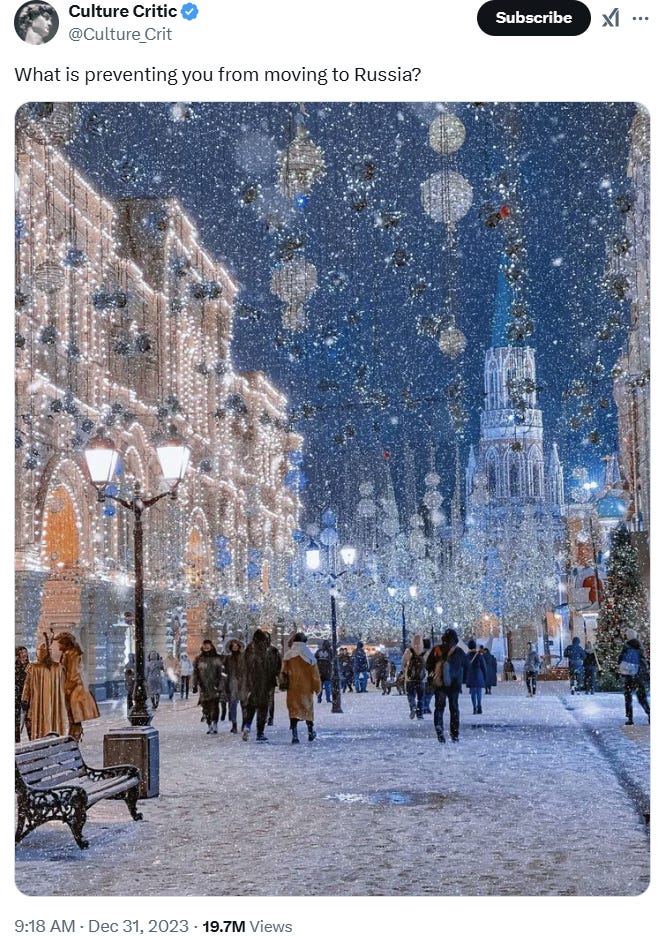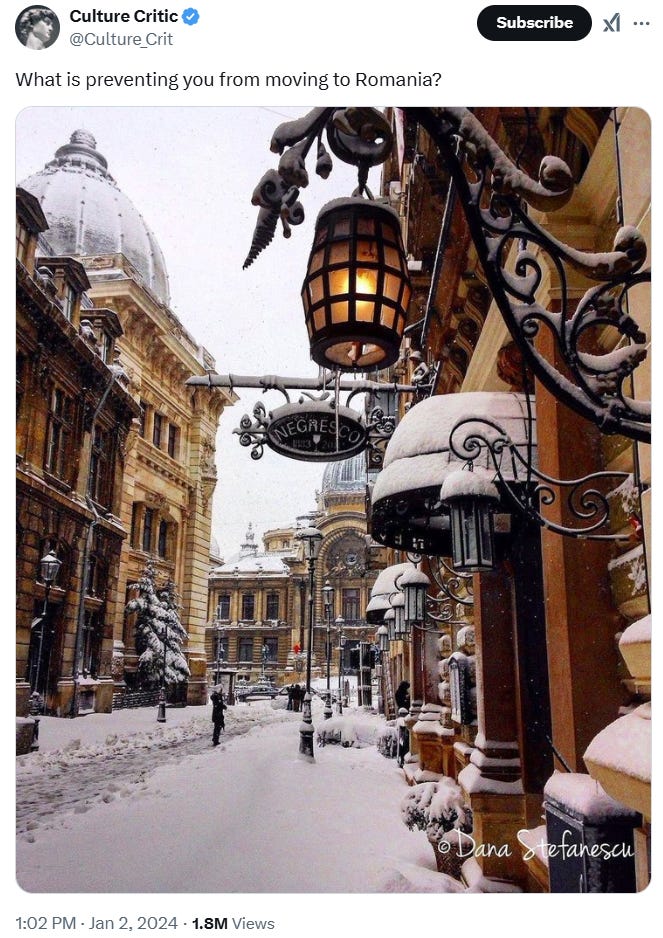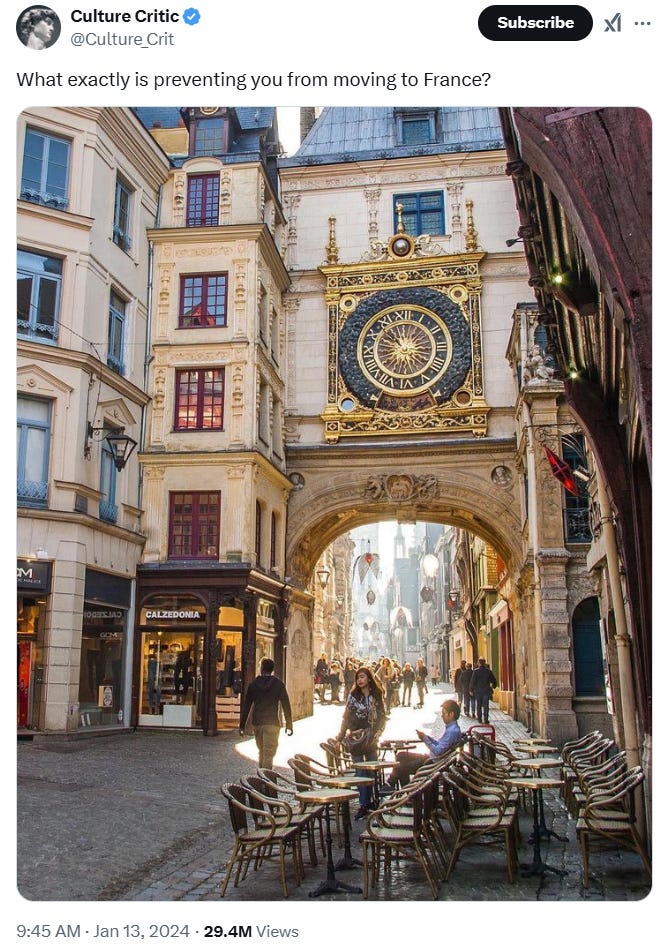A year ago, one of the big “statue accounts” on Twitter—a name some folks give these traditionalist, right-wing-ish accounts that post about Western civilization and things like that—posted this:
Many of the replies, of course, went something like “because it’s run by an imperialist autocrat” or “because it’s in economic collapse.” A few responses took it as an explicit endorsement of Russia as it exists today, which fits with the notion that the “statue account” types are closet fascists, and that traditional architecture and the beauty of the West and all that are basically dog whistles for hard-right politics. (If you don’t quite know what I’m talking about here, just know that this is a thing on social media.) I was a bit surprised/perplexed that one of these guys would actually suggest moving to Russia. I thought to myself, huh, maybe the lefties who look askance at the statue account-types are on to something.
But then, it turned out this was just a series showcasing beautiful European cities:
Now this is where it gets interesting. You could have an argument about meaning here, about implied and inferred meanings, about how much a speaker needs to imagine the ways in which they could be misunderstood, etc.
On the one hand, a historic city or a historic culture is what it is, regardless of who governs it right now or how that country is perceived in political discourse at the moment. You wouldn’t probably actually move to Russia right now, but Putin doesn’t invalidate everything else that Russian history, culture, and architecture are. It would be crazy to take this city-showcasing exercise as a coded endorsement of Putinism, let alone fascism writ large—especially when he also featured cities from Western European (i.e. NATO and EU) countries. In other words, there is no dog whistle here to perceive. You’d have to be paranoid or dishonest to think there’s an implied meaning here. If you strain too much to hear a dog whistle, you become a conspiracy theorist.
On the other hand, Russia today is what it is, regardless of however beautiful some parts of some of its old cities might be. “Why don’t you move to Moscow, it’s beautiful!” simply is like praising the interior decoration of, say, a plantation house before the Civil War. It’s that way because the actually existing current world has made it that way. And to pretend you can just dispense with the actual context that reality presents you with is the dog whistle or alternative meaning. What you’re implying is that it’s okay to act as though things that are really happening in the real world aren’t really happening; that we can simply wish our own reality into existence.
So which of these views is correct? Is saying “why don’t you move to Russia?” with a nice picture of Moscow in winter completely innocent (or at least, able to be), or does it inherently come with baggage that reality imposes on it?
I think about this sort of thing a lot—too much, I’m sure—because when you write and communicate ideas and promote them online, you have to be aware of all the ways in which your words can be purposely or mistakenly twisted. And at some point, perhaps, this awareness can almost make you start to think like the worst people out there.
I had this conversation with a friend in college, years ago, who thought some offhand statement was some kind of implied remark about her race. Maybe it was, but we got to talking about one of her professors, who actually said he refused to talk about stereotypes, because he didn’t want to pass them on—he believed it was maybe possible we could forget them, instead of looking for them so intently that we might actually incarnate them anew. There’s a similar thing going on here.
Here’s a different example: I remember a big housing advocate tweeted about some project and said something like, “This is going to be all childless high-income singles or couples in this building, it’s pure money for localities.” I remembering thinking he was knocking the idea of having kids, or implying that kids are a liability, or something like that. And I remember thinking, Gee, if this is the way urbanists and housing folks think about families and kids, maybe this isn’t all so great.
At some later point I realized that what he was saying was, “NIMBYs always talk about how more housing means more kids, and more kids mean strain on the school system and/or higher taxes. So in theory NIMBYs should be appeased by housing that is more likely to be filled up by 1) high-income folks and 2) not generate a lot of new school enrollments.” I took a targeted argument meant for the NIMBYs as an attack on families! This is one of those things that can happen when you lack the full context of what every party in an issue area thinks, how each party will perceive explicit or coded words, etc. etc.
What is the answer to this? It seems exhausting to have to keep this inventory of information, all of which sort of bends your mind towards paranoia or suspicion or the presumption of being misunderstood. Is there any answer, or is this just what communicating ideas in a touchy subject comes down to?
I’d love to hear your thoughts.
Related Reading:
Thank you for reading! Please consider upgrading to a paid subscription to help support this newsletter. You’ll get a weekly subscribers-only piece, plus full access to the archive: over 1,100 pieces and growing. And you’ll help ensure more like this!







I try to avoid instant responses. Some inexpert people are trying to be sarcastic without explicitly marking it, which always causes trouble.
Some expert propagandists use parody as a post-hoc trick. When they say something that turns out to be wrong, they backdate it as parody. "Everything I say is ironic, unless I tell you it's true right now. But I'll probably change my mind and call it ironic tomorrow."
Also, the best "statue account" is Cultural Tutor!